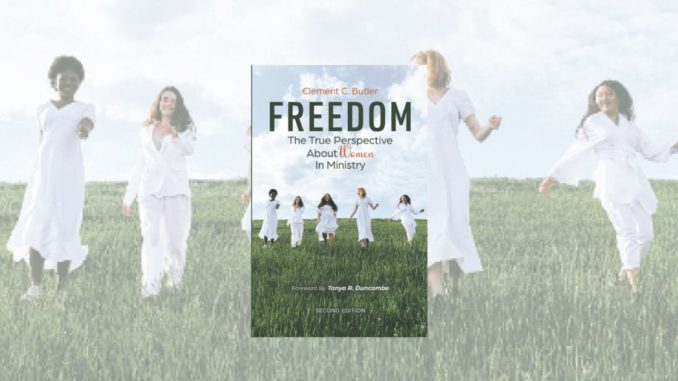
Published by Wipf & Stock Publishers on April 19, 2021
Genres: Non-Fiction, Theology
Buy on Amazon
Goodreads

What is God’s perspective regarding women in ministry? Is gender a deciding factor in determining leadership roles in the body of Christ? Should women be silent in the churches? The answer to these questions along with many more regarding women in ministry are adequately addressed in this book.
Without question, the subject of women in ministry continues to draw mixed conclusions across a broad spectrum of people. However, this book uses the proper context of Scripture to offer the true perspective concerning this provocative topic. Based on study, discussions, and inquiries, I truly believe this book is a comprehensive offering regarding the subject. I am persuaded that after reading this book, the outcome will be one thing: Freedom!
Freedom: The True Perspective about Women in Ministry caught me with its rather provocative title. Christians have debated the topic for generations and, although I’m solidly convinced that there’s an abundance of evidence for the affirmative, to say one has the “true” perspective is a pretty bold claim that’s somewhat needlessly confrontational. Not that I think author Clement Butler is wrong, just that it struck me as odd for academic writing. I wondered what arguments Butler might bring to the table that would be different than the same old arguments that are continually rehashed.
Unfortunately, Freedom is just more of the same written in a fairly juvenile and non-academic fashion. Butler isn’t wrong. He covers the topic well. He shows a foundational understanding of the texts at play and their various interpretations. But his level of writing left me feeling like a religion professor grading a series of undergraduate essays. I’d give him a B+, but it’s not something I’d publish.
Butler writes myopically, never really engaging other perspectives. He presents the egalitarian perspective in a simple, straightforward manner but doesn’t engage with critics of that position or go much beyond an elementary understanding of the texts. He’s also self-referential, constantly referring to his other books or quoting himself. This book was billed as a “Second Edition,” which made me incorrectly assume that this was written as a textbook. Maybe that’s on me, because the truth is that the first edition appears to have been a very similar self-published work a few years earlier.
The writing itself ranges from serviceable to laughable. For example, in his discussion of 1 Corinthians 14:34-36, Butler notes that Paul may be quoting the Corinthians when he says “for it is a shame for women to speak in the church” and responding to them with a sarcastic “What? came the word of God out from you?” While this is a viable interpretation held by prominent scholars (Gilbert Bilezikian, for example), it’s hardly the clearest or strongest interpretive option. Further, Butler makes way too much of the “What?” writing:
“According to the Urban Dictionary, this reaction is rhetorical and is asked to undermine someone’s point or position. In everyday language, it’s the same as ‘I can’t believe you just said that.’”
I shouldn’t have to explain that interpreting Scripture through the lens of Urban Dictionary definitions is not good exegetical work. Citing Urban Dictionary as an authoritative source that emphatically puts to rest a longstanding theological debate is something I’d expect from a middle schooler. It was in this argument that, for me, Butler lost all credibility as a scholar. He understands the issue, certainly, but his position is still one of a learner and not that of a teacher.
After some research, I found a bio for Butler that says he has an undergraduate degree from Principles of Life Bible College in the Bahamas. There is no website for this school and a Google search for the school returns 21 results (you read that right), 13 of which are bios on the author. I did track down a LinkedIn profile for a person claiming to be President of Principles of Life Bible College, who boasts a Ph.D. in “Human Consciousness” from the University of Metaphysics in Las Vegas. Yeah. It’s a diploma mill. Oh, and also the book’s intro links to the author’s website—a website that no longer exists. Is this all a bit ancillary to the actual review? Probably, but it’s the rabbit trail I went down and honestly the most interesting thing to come out of reading this book.
